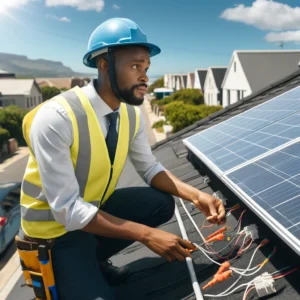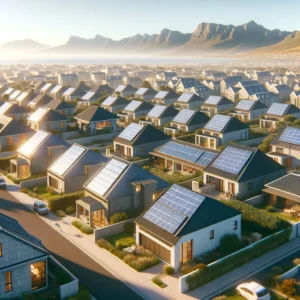As Cape Town strives towards sustainability, many homeowners and businesses are looking to invest in rooftop solar installations. However, the process of obtaining the necessary permits and passing inspections can often seem daunting. This article aims to demystify these steps, ensuring that you can transition to solar power smoothly and efficiently.
Why Go Solar in Cape Town?
Cape Town’s sunny climate offers abundant solar energy potential, making it ideal for rooftop solar installations. By harnessing this renewable resource, residents can reduce their carbon footprint, cut energy costs, and enjoy the reliability of a sustainable energy source. Moreover, the City of Cape Town supports solar initiatives through various incentives, underscoring the benefits of making the switch.

Understanding the Permitting Process of Rooftop Solar Installations
Step 1: Initial Assessment
Before diving into the paperwork, it’s crucial to assess whether your rooftop is suitable for solar panels. This involves considering the structure’s orientation, shading, and physical condition. Consulting with a certified solar installer can provide you with a feasibility report and initial guidance.
Step 2: Application for Permission
Once your roof is deemed suitable, the next step is to apply for permission from the City of Cape Town’s electricity services department. This application should include detailed system specifications and a site plan. It’s important to ensure that all documents are accurately filled to avoid delays.
Step 3: Engineering Approval
For systems that will be connected to the grid, engineering approval from the local municipality is required. This step verifies that rooftop solar installations comply with all safety standards and electrical regulations.
Step 4: Inspection
Post-installation, an inspection by a certified electrical inspector is mandatory to ensure that the installation adheres to the National Building Regulations and Standards. This inspection focuses on aspects like wiring, the integrity of the mounting structure, and overall safety.
Navigating Inspections
Inspections are a critical component of rooftop solar installations, designed to ensure safety and compliance. Here’s what you can expect:
Initial Inspection
This occurs after the solar panels are installed but before they are connected to the grid.
Initial inspections are a pivotal stage in the process of installing rooftop solar systems, ensuring that every aspect of the installation adheres to stringent safety and quality standards before the system becomes operational. This stage involves a thorough examination of the physical installation and electrical components by a certified inspector. The purpose of this scrutiny is to confirm that the installation complies with local building codes, electrical codes, and any specific solar photovoltaic installation regulations that might be in effect in Cape Town.
The inspection focuses on several critical areas: the mounting of panels, the integrity of the roof structure, the electrical wiring, and the correct installation of inverters and meters. The inspector checks that the solar panels are securely attached to the roof and that the mounting system is structurally sound, which is crucial in Cape Town’s varied climate that can expose homes to strong winds and heavy rains. They also ensure that there is no undue stress on the roof that could cause damage over time.
Electrical safety is another significant concern during the initial inspection. The inspector examines the wiring from the solar panels to the inverter, ensuring that all connections are secure and that the wiring is up to national and municipal electrical standards. This includes verifying that the electrical insulation is intact and that grounding systems are correctly installed to prevent electrical faults that could lead to fire hazards or equipment failure.
Inverters, which convert the direct current (DC) output of the solar panels into alternating current (AC) used by home appliances, are also closely inspected. The inspector checks that they are properly configured and installed according to manufacturer’s specifications and that they comply with any local utility requirements for grid connection. This is particularly important for grid-tied solar systems, where energy efficiency and safety directly impact the broader electrical grid.
The initial inspection is not only a compliance check but also a quality assurance measure that protects the homeowner’s investment in solar technology by identifying and mitigating potential issues early in the installation process. By ensuring that all components are installed correctly and safely, the inspection helps in preventing future problems that could interrupt service and incur additional costs. Moreover, successful initial inspections can significantly speed up the approval process for connecting the solar system to the local power grid, bringing homeowners one step closer to benefiting from renewable energy.
Final Inspection
The final inspection in the process of installing rooftop solar systems is as crucial as any other step, serving as the definitive assessment that ensures the entire installation is operational, safe, and ready to be connected to the electrical grid. This inspection occurs after the initial checks and once the solar panels and related systems are fully installed and operational. The main focus here is to evaluate the functionality of the entire system and to confirm compliance with both national safety standards and local regulations.
During the final inspection, an authorised inspector conducts a series of tests and checks to verify that every component of the solar installation functions as intended. This includes a detailed examination of the inverter settings and outputs to ensure they match the specifications necessary for grid compatibility. The inspector also tests the safety mechanisms, such as ground-fault and arc-fault circuit interrupters, to confirm they are operational and can effectively protect the system against electrical faults and potential fire hazards.

Another critical aspect of the final inspection is the verification of the system’s metering equipment. This equipment must accurately record the amount of electricity generated and consumed, which is essential for billing and tracking energy usage. The inspector ensures that the meter is properly calibrated and securely connected, and that it communicates correctly with the utility’s systems if the setup involves net metering.
Energy efficiency is also a key concern. The inspector evaluates the system’s capacity to produce power at the expected levels. If the output is below expectations, it could indicate issues with the panel placement, inverter configuration, or other system components. Addressing these issues at the final inspection stage can prevent long-term performance problems.
Finally, the completion of the final inspection often involves a review of documentation to ensure that all warranties and manuals are handed over to the homeowner, providing them with necessary resources for future maintenance or service needs. Once all these criteria are met, and the system passes the final inspection, it receives official approval for operation. This is a significant milestone as it allows the homeowner to start reaping the benefits of their solar investment, contributing to a greener footprint and potentially significant savings on energy bills.
Tips for a Smooth Permitting and Inspection Process
- Hire Reputable Contractors: Ensure that your solar installer is certified and has experience with local regulations.
- Stay Informed: Understanding the basics of solar technology and local codes can help you communicate effectively with installers and inspectors.
- Prepare for Delays: Delays can happen, particularly with complex installations or during busy periods for inspectors. Factor this into your project timeline.

The Benefits of Compliance
Adhering to the permitting and inspection process is not just about following the law. It also enhances the safety, efficiency, and durability of your solar installation. Moreover, compliance ensures that you qualify for any available solar rebates or tax incentives, which can significantly offset the initial installation costs.
Rooftop solar installations are a fantastic way to harness Cape Town’s abundant solar energy, offering long-term benefits that outweigh the initial hurdles of permitting and inspections. By understanding and preparing for these processes, you can ensure a smooth transition to solar power, contributing to a greener future for Cape Town.
Engaging in the process of solar installation with a clear understanding of the requirements and challenges can transform a seemingly daunting task into a rewarding investment in sustainable energy.
This comprehensive guide aims to prepare you for a successful solar installation project, making your journey towards sustainable living as seamless as possible. By taking the right steps and preparations, you can look forward to reaping the environmental and economic benefits of solar power for years to come.
